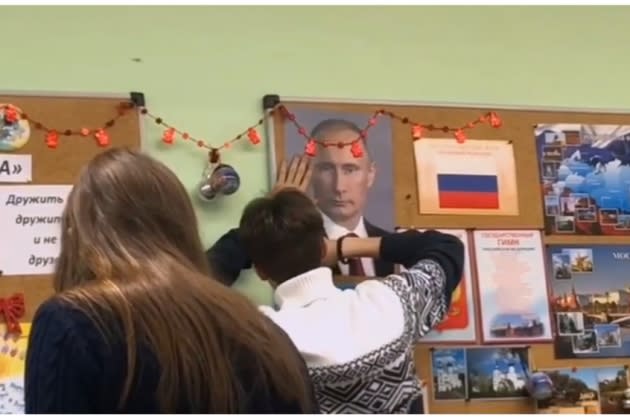‘Manifesto’ Review: Disturbing Found-Footage Doc Evokes the Terror of Adolescence in Putin’s Russia

Fifteen years from its inception, YouTube retains the power to shock and disorient — particularly when wielded by children who have lived their whole lives in its era. A found-footage documentary composed entirely of social media videos by teenagers weathering hostile education and a climate of terror in contemporary Russia, “Manifesto” contains one vignette after another to make viewers wince with discomfort and even outright horror. One’s first impulse might be to ask whether any documentary should show such material at all — yet of course, it has been freely available for public viewing all along. As such, “Manifesto” invites uneasy consideration of the differing responsibilities of creating, consuming and externally curating candid video, and provides no guidance.
In selecting and assembling several years’ worth of amateur video into a constructed, collective life-in-a-day feature, the presumably pseudonymous filmmaker Angie Vinchito takes considerable risks of decontextualization. There’s no narration to bind or editorialize these disparate but symphonically despairing mini-narratives of physical abuse and psychological oppression, and “Manifesto” counts on viewers’ knowledge of recent Russian politics and social norms to determine which videos present uncompromised reality, which may be documenting pranks or performance, and which have been alarmingly coerced.
More from Variety
Grace Phelps-Roper's Escape From the Westboro Baptist Church to Be Explored in 'Where We Belong'
Kidnapping of Actor Hans Christian Ostrø Revisited by Sister in 'The Golden Swan'
Confusion is at least partly the point, reflecting the environment of unreliable authority and media in which these teens have grown up, and that makes for a challenging, often stimulating work — one that impressed the Envision competition jury at IDFA, where “Manifesto” world-premiered, into handing it their top prize. Further documentary festival play is assured, given the political urgency of the material and debate-stoking nature of its approach, though distribution is a tough prospect for a film that requires every trigger warning in the book. “Manifesto” instead begins with a cautious disclaimer that “it is not the goal of this film to encourage opposition of any kind … or any other action directed at disrupting the public order.” International audience sympathies, meanwhile, are likely to fall with the disruptors.
Things begin benignly enough, with an iPhone alarm heralding the start of a regular school day, and assorted young videographers taking us cheerily through their morning routine. Yet soon enough an emergency siren wails across multiple videos — whether they’re differing angles of the same event or depicting multiple crises across the country is initially ambiguous — as our young camerapeople wonder if nuclear war has struck, a school shooter is on the loose, or whether it’s simply a drill in progress. In some cases, their fears are founded, their always-on phones capturing the panicked scramble of evacuations or glimpsing armed predators. Even in the face of genuine threat, however, they’re often stoic: “That’s it, this is my last video,” one teen shrugs. “Anything could happen now,” says another in a resigned tone.
As we move into footage of more commonplace violence in the classroom and beyond, we understand their numbness. Handheld cameras bear witness to horrifying scenes of teachers assaulting and verbally abusing students for perceived dissent from the propagandistic syllabus. One girl, mascara streaming down her cheeks, tells her front-facing camera about being expelled, and potentially reported to the authorities, for voicing her own political opinions. Other videos sees kids announcing plans to attend a rally for opposition leader Alexei Navalny, and later dealing with the consequences of doing so from police and parents alike. One boy announces he has been evicted from his home by his father, zooming out to reveal a mattress on a snow-blanketed street. Is he joking? We can’t know.
Most disturbingly, “Manifesto” segues into a series of mea culpa videos from Chechen teenagers apologizing for protesting the authority of autocratic leader Ramzan Kadyrov. It seems clear enough that they’ve been forced into these confessionals by dominant elders — one boy is even flanked in his video by the hulking older brothers who “explained things to me” — but again, Vinchito lets the tone and text of the selected materials speak for themselves, sometimes in discomfiting conflict. There’s less ambiguity, however, in the shattering finale, a live-stream of the last stand by teenage couple Katia Vlasova and Denis Muravyov, who jointly died by suicide after shooting at police and being cornered by them — a headline-making case here stripped back to their raw video of the event. There’s nothing and everything else to say: Bold and unnerving and openly questionable in its perspective, or absence thereof, “Manifesto” primarily acts as a signal boost for young lives lost and in dangerous limbo.
Best of Variety
Sign up for Variety’s Newsletter. For the latest news, follow us on Facebook, Twitter, and Instagram.

